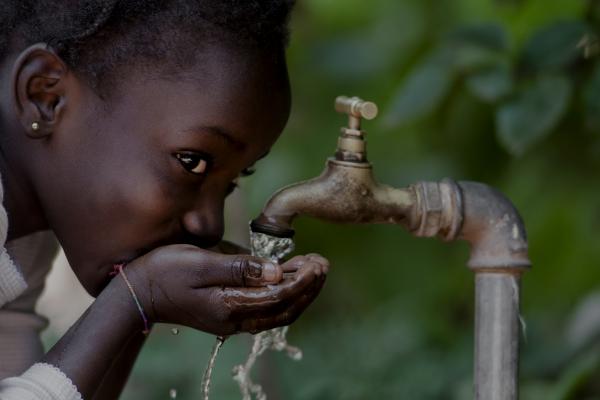Try to imagine your morning routine without water. Brushing your teeth, taking a shower, using the bathroom, making tea or coffee. Practically every step requires a lot of water — clean and easily accessible.
For millions of women around the world, the morning routine is very different.
In developing countries around the world, women spend up to five hours every day collecting water from distant and often polluted sources, returning to their villages carrying 40-pound jerry cans on their backs. Water.org reports that women and children in 45 developing countries bear the primary responsibility for water collection. Bodies break down under the weight and often the water makes families sick. Some 50 diseases are related to poor water quality and lack of sanitation. And it’s the children under five who suffer the most.
Dignity and safety are hard to come by in a world without water and sanitation. Women and girls must sneak off into a secluded field in the dark of night for privacy, where some will be molested or raped. When a girl reaches puberty, she is either humiliated at school or misses several days each month — many drop out altogether just to manage menstruation. It’s an unfair reality that keeps millions of young women in poverty, with no way out.
It is hard to believe that in 2015, 663 million people still lack improved drinking water sources and 2.5 billion do not have proper sanitation. Faiths for Safe Water recognizes that “water is the single sacred symbol shared by every faith, but it’s the world’s dirty secret.”
Jesus famously said in a parable, “The King will reply, ‘Truly I tell you, whatever you did for one of the least of these brothers and sisters of mine, you did for me.’” If we truly follow Jesus, we will change this global reality that commits generations to sickness and poverty, dangerous conditions, food insecurity, and water wars.
How can we begin? Voices of faith must join influential voices like Gertrude Maseko, First Lady of Malawi, who along with dozens of prominent female leaders, signed the Women for Water and Sanitation Declaration this year. This declaration asks world leaders to make water, sanitation, and hygiene (WASH) a key priority in the United Nations Sustainable Development Goals, specific goals that will guide the world in its work to overcome global poverty by 2030.
Last year, several U.S. organizations and faith groups joined together in support of Senator Paul Simon’s Water for the World Act, which made American foreign assistance around WASH more efficient, targeting communities with the greatest need. The bill was passed unanimously during the last days of the 113th Congress and was signed into law by President Barack Obama in December 2014, proving bipartisanship is possible.
This kind of life-saving leadership must continue. With improved efficiencies under the Water for the World Act, voices of faith must now ask the U.S. government to increase funding to no less than $400 million for WASH in fiscal year 2016 — a modest and realistic increase from $382.5 million in fiscal year 2015. Increased WASH funding would allow the U.S. to continue to build on forward momentum that advances the economy, food security, and education for girls and women, their families, and entire villages. It’s not an overstatement to say such economic improvements lead to a better world — from global security to increased trade.
Water is fundamental to all life. Every religion and denomination has a faith-based global health and development organization doing vital work around the world. Let’s make sure that among that great work, they are prioritizing water, sanitation, and hygiene. Together we can make water, the symbol all faiths share, the source of life and liberty for all.
Got something to say about what you're reading? We value your feedback!
